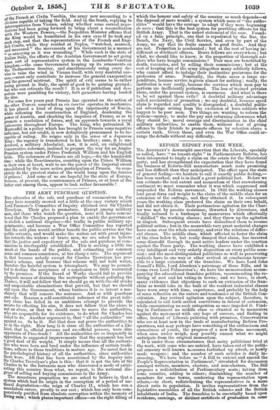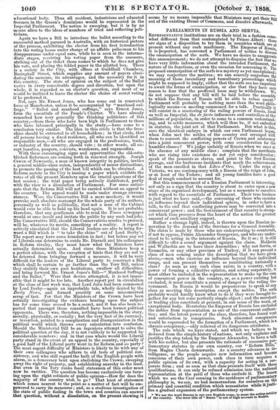REFORM REPORT FOR THE WEEK.
Mn. ADDERLEY'S downright assertion that the Liberals, specially so called, have "no tenant-right" in Parliamentary Reform, has been interpreted to imply a claim on the estate for the Ministerial party, and has strengthened the expectation that they have found the business of Reform-Bill manufacture much more promising and less difficult than they anticipated. The effect upon the state of general feeling—we hesitate to call it exactly public feeling,— has been marked, and is in itself a great political fact. Before we can estimate the real extent and momentum of that reawakening sentiment we must remember what it was which suppressed and suspended the Reform movement. In 1832 the working classes lent great force and weight to the claim of the middle class for an extension of the suffrage, and they obtained it. In subsinent years the working class preferred the claim on their own behalf, and did not obtain it. Their pertinacious agitation for the Char- ter was met by passive resistance, thwarted by diversions, and finally reduced to a burlesque by manceuvres which effectually " clidoiled." the working classes ; and they. threw up the agitation in disgust. Subsequent events have disinclined them to resume political action ; but in the meanwhile very great material changes have come over the whole country, and over the relations of differ- ent classes. The middle class which affected to foster the claim of the class below it, but really damped that claim, has incurred some discredit through its most active leaders under the reaction against the Peace party. The working classes have exhibited a very intelligent and very orderly disposition on every public occa- sion; and the most distinguished politicians as well as persevering radicals have in one way or other arrived at conclusions favour- able to a large extension of the franchise. We have Lord John. Russell's Bills, Lord Aberdeen's patronage of those Bills, and in terms even Lord Palmerston's • we have the memorandum accom- panying the educational franchise petition, recommending the re- viving of scot and lot voting in towns ; and we have, in short, many evidences that objections to such an extension of the fran- chise as would take in the bulk of the resident industrial classes have worn away with time, experience and probably by the help of some reflection on the nature and tendencies of the British Con- stitution. Any revived agitation upon the subject, therefore, is calculated to call forth settled convictions in favour of extension, while encountering no such antagonism as owe impeded it. Find- ing in Parliament no middle class so situated as to manceuvre against the movement with any hope of success, and finding in office, instead of Liberals paltering with promises, Conservatives who are at least new in the trade of manufacturing Reform Pro- spectuses, and may perhaps have something of the enthusiasm and earnestness of youth, the progress of a new Reform movement, when once under weigh, may possibly exceed what we might anticipate from the original momentum. It is under these circumstances that maily politicians tried at the work, with some who are untried, have taken out of the politi- cal armoury well known maasures furbished up afresh, or newly made weapons : and the number of such articles is daily in- creasing. We have before us "A Bill to extend and amend the People's Representation in Parliament," circulated for discussion amongst writers, members, electors, and non-electors. The Bill proposes a redistribution of Parliamentary seats ; taking from some counties, adding to others; diminishing the number of members for some towns, conferring the representation upon others,—in short, redistributing. the representatives in a snore direct ratio to population. It invites representatives from the legislative assemblies of all the British colonies and the British inhabitants of India. The franchise to be essentially based upon residence, earnings, or distinct certificate of graduation in some
educational body. Thus all resident, industrious and educated freemen in the Queen's dominions would be represented in the Imperial Parliament. The notion is sweeping, but it is by no means alien to the ideas of numbers of tried and reflecting poli- ticians. Again we have a Bill to introduce the ballot according to the successful method pursued in Australia, with an historical picture of the process, exhibiting the elector from his first introduction into the voting house under charge of an affable policeman to his disappearance under equal care, while he is seen in the interme- diate stages, receiving his voting paper from the assessors, striking out of the ticket those names to which he does not give his vote, and placing the folded paper in the allotted box. There is a society in the City, with offices at Guildhall Chambers, Basinghall Street, which supplies any amount of papers eluci- dating the measure, its advantages, and the necessity for it in this country. The state of opinion on the subject of the Ballot varies in every conceivable degree and direction, but upon the whole it is regarded as an elector's question, and most of us would be inclined to leave the elector the choice of secret voting if he preferred it.
Not, says Mr. Ernest Jones, who has come out in renovated force at Manchester, unless it be accompanied by "manhood suf- frage." "Ballot and manhood suffrage," says Ernest Jones, form the essentials of the People's Charier. We have already remarked how very generally the thinking politicians of this country,—from those who have been high in Parliament to those who have laboured principally in the study,—have come to a conclusion very similar. The idea in this circle is that the fran- chise should be entrusted to all householders ; in that circle that all persons having a fixed residence, all who can be identified as responsible men,—all who are engaged in the professions, trade, or industry of the country, should vote ; in other words all ex- cept lunatics, paupers, convicts, wanderers' and ragamuffins. With these encouraging signs and opportunities the old-esta- blished Reformers are coming forth in renewed strength. Joseph Cowen of Newcastle, a man of known integrity in politics, invites a general middle-class union, independently of minor distinctions, to promote the passing of the best bill which can be obtained. A Reform society in the City is issuing a paper which exhibits the votes of all the present Members upon the crucial questions of the last session ; the trial paper being actively distributed, partly with the view to a dissolution of Parliament. For some antici- pate that the Reform Bill will not be carried without an appeal to the country. The appeal would be made under strange circum- stances. Were the Conservative Bill a mere mockery, it would provoke such absolute contempt for the whole party of its authors, personally as well as politically, that not a man of the Cabinet would ever be able to hold up his head again. It is not probable, therefore, that any gentleman able to read the Times newspaper would at once insult and irritate the public by any such bad joke. The Conservative Bill, should the Conservatives resolve to proceed, will be, whatever its merits, something of a reality. A report is actively circulated that the Liberal leaders are also to bring for- ward a Bill which is "to take the shine" out of Lord Derby's. The report may have some foundation in fact ; but before any set of Liberals can determine to outdo Mr. Disraeli and his colleagues in Reform rivalry, they must know what the Ministers have actually determined upon. And since those Ministers keep a a perfect silence, with the exception of hints that they are not to be deterred from bringing forward a measure, it will be very difficult for the leaders of the Liberal party to construct a Bill which shall be certain to go further than the Tory Bill, unless • they stultify their own past hesitations, swallow all difficulties, and bring forward Mr. Ernest Jones's Bill—" Manhood Suffrage and the Ballot." Were that device attempted, it is not impos- sible that it might be too late. Another report put in circulation at the close of last week was, that Lord John had been summoned by Lord Derby—again an improbable tale, wholly denied by the Daily News, and formed possibly on some misconceived. scrap of fact. For that the Ministers of the Crown have been actually investigating the evidence bearing upon the subject has for some time ceased to be a secret, and it has also been re-. ported that amongst those consulted have been former political opponents. There was, therefore, nothing impossible in the story, morally, physically, or socially ; but the very fact of its currency, or invention, pointed to a complication and disorganization in the political world which throws every calculation into confusion. Should the Ministerial Bill be an ingenious attempt to solve the political question of the day, it is not enlilrely to be supported by considerable numbers ; and in that case where would the Liberal party stand in the event of an appeal to the country, especially if a good half of the Liberal party went in for Reform and no party? The most cogent difficulty of Ministers is likely to lie with any of their own colleagues who adhere to old tests of political con- sistency, and who still regard the bulk of the English people with alarm, as a democracy bent upon abolishing the Crown, sweeping away the right of property, and establishing anarchy in the land. But even in the Tory ranks fossil statesmen of this order must now be rarities. The question has become exclusively one turn- ing.upon the right estimate of public opinion—How far does the majority of the country wish to go ? That knot of statesmen which comes nearest to the point as a matter of fact will be em- powered to carry its measures ; and, as a studious investigation of the state of public feeling in the town and counties can answer that question, without a dissolution, on the present showing it
seems by no means impossible that Ministers may get their Bifl out of the existing House of Commons, and dissolve afterwards.



































 Previous page
Previous page